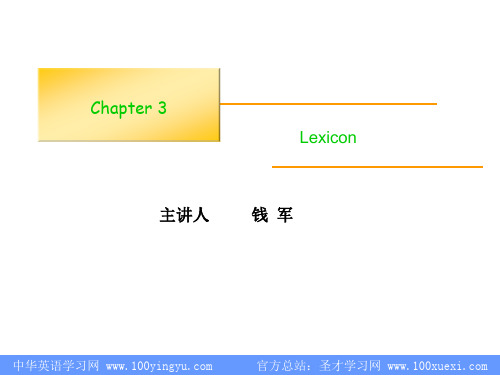
Word 4: writing Word 5: written ■Word 2 “fat” fat fatter fattest ■So WORD may be used both as a general term (then fat, fatter, and fattest are just one word) and as specific items (then fat, fatter, and fattest are three words).
Chapter 3 Lexicon主讲人Fra bibliotek钱 军
中华英语学习网
官方总站:圣才学习网
3.1 What is word? 3.1.1 Three senses of “word” 3.1.2 Identification of words 3.1.3 Classification of words 3.2 The formation of word 3.2.1 Morpheme and morphology 3.2.2 Types of morphemes 3.2.3 Inflection and word formation 3.2.4 Sememe vs. morpheme, and phoneme vs. morpheme 3.3 Lexical change 3.3.1 Lexical change proper 3.3.2 Morpho-syntactical change 3.3.3 Semantic change 3.3.4 Phonological change 3.3.5 Orthographic change
中华英语学习网
官方总站:圣才学习网
■Predeterminers: all, both; half, one-third, three-quarters …; double, twice, three times …; such, what (exclamative), etc. ■Central determiners: the; this, these, that, those; my, our, your, his, her, its, their; which, what (relative), what (interrogative); a, another, some, any, no, either, neither; each, every; enough, much, more, most, less; a few, a little), etc. ■Postdeterminers: next, last, past, additional; many, several, few, little; one, two, three …; (a) dozen), etc. ■When different sub-classes of determiners occur together, they follow the order of pre-determiners + central determiners + post-determiners.(×*five the all boy,√all the five boys) ■*their all trouble ■*five the all boys ■*all this boy ■*all both girls
















